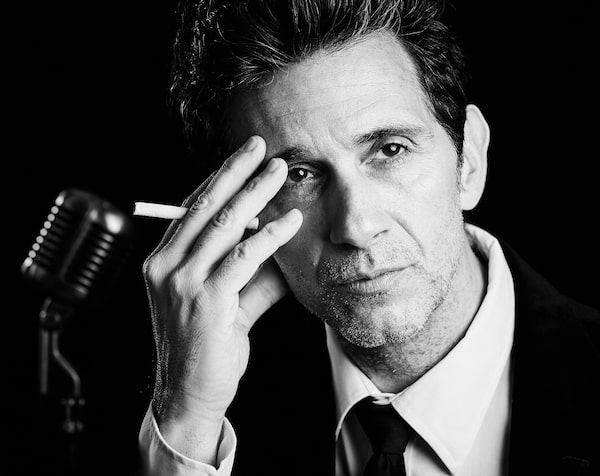
Actor Ronnie Marmo plays Lenny Bruce in the one-man show I'm Not A Comedian… I'm Lenny Bruce at Toronto’s Meridian Arts Centre.Doren Sorell/Supplied
Actor Ronnie Marmo recently dropped into a Seattle record shop looking for some Lenny Bruce on vinyl. But Marmo, who is currently touring a one-man show about the life and tragic times of the profane, free-wheeling comedic legend, didn’t see any Bruce records in the comedy bin. He was advised to check the poetry/spoken-word section instead.
“The clerk was a young guy, maybe 25 years old,” Marmo says. “I wondered who made the decision to put Lenny Bruce in the spoken-word aisle.”
Whoever it was, could they be blamed? Marmo’s own play is called I’m Not a Comedian … I’m Lenny Bruce. So who is Lenny Bruce, then? The Brooklyn-born Marmo spoke to The Globe and Mail about that very question in advance of a four-night run of his Bruce show at Toronto’s Meridian Arts Centre (June 21, 22, 24, 25).
We know that Lenny Bruce was in fact a comedian, but, really, how funny was he?
He never went on stage just to make people laugh. He had a lot to say. He had an opinion, and some of it wasn’t funny.
If he wasn’t going for laughs, what was he going for?
I think the bottom line was that Lenny had a very funny mind. He was one of the first comedians to get on stage without a set routine. He’d bring a newspaper. He was funny by default, but his bits didn’t always have an end to them. His purpose was to examine what was going on in society, whether it was hypocrisy, religion or whatever. He made you think. He changed the comedy game.
Like bebop jazz changed music.
He didn’t have an act. He was also crossing boundaries, upsetting the status quo and the authorities. He was asking, “But why? Why?”
His autobiography was How to Talk Dirty and Influence People. Can we say his legacy is his influence on other comedians rather than the comedy itself?
That’s fair to say. He was not the funniest of the group. Rolling Stone had a list of the top 50 comedians of all time. Lenny was ranked third, behind George Carlin and Richard Pryor. I’m okay with that. As far as his influence, I think comedians like Dave Chappelle and Chris Rock would not be doing what they do today if not for Lenny. He opened the door for that.
Is your play funny?
It is. It’s also a tragedy.
How dark is it? Lenny’s daughter, Kitty Bruce, worked with you on it. Is it sanitized?
She’s been with me every step of the way. We’re very close. I have the rights to the material in perpetuity, and Kitty signed off on all that. But when I wrote the script, I told her I was going to tell his story. You meet the man, warts and all. Nothing was altered. Not to give too much away, but I start my play sitting dead and naked on the toilet.
His drug overdose. How did his daughter react to that?
It took her a year to even see it. When she finally came, she sat in the front row, which was terrible for me. She was with actor Joe Mantegna, who directed the play. They held hands the whole show. She gave me the biggest compliment. She said it was the best portrayal she’d ever seen.
Presumably she’s seen the television series The Marvelous Mrs. Maisel, in which Bruce is a reoccurring character. What’s your assessment of Luke Kirby as Lenny?
I don’t want to spend time picking apart his performance. I’m doing my own thing. But he’s a good actor, he did a good job and I’m grateful. It’s opened a door for others to come see what I’m doing.
Are we seeing a Lenny Bruce revival?
I think there’s a resurgence to a new generation, and I think Maisel had a lot to do with that. I see lots of 20-year-olds in my audience. When I was writing this play, I thought I’d be touring up and down Florida to older crowds. Suddenly, The Marvelous Mrs. Maisel changed the game and the trajectory of my show.
That series is over, but Kirby told Vanity Fair recently that he’s still carrying Bruce around inside him. What’s your own relationship with Bruce? How method are you?
I don’t sleep on the street all night long so that I’m tired the next day. I’m not quite that kind of actor. I’ve done 419 performances of this 90-minute monologue. It’s easy to do an impression or a characterization of an icon. But I don’t do impressions. I don’t know how to. I had to find where he was inside me.
And where was that?
What you see with me that maybe you haven’t seen in other people’s interpretations is that I love the guy. It’s a love letter to Lenny, even though I don’t leave out the adultery and the drugs. What I do is humanize the guy, and it rips my guts out every night.
This interview has been condensed and edited.
Keep up to date with the weekly Nestruck on Theatre newsletter. Sign up today.